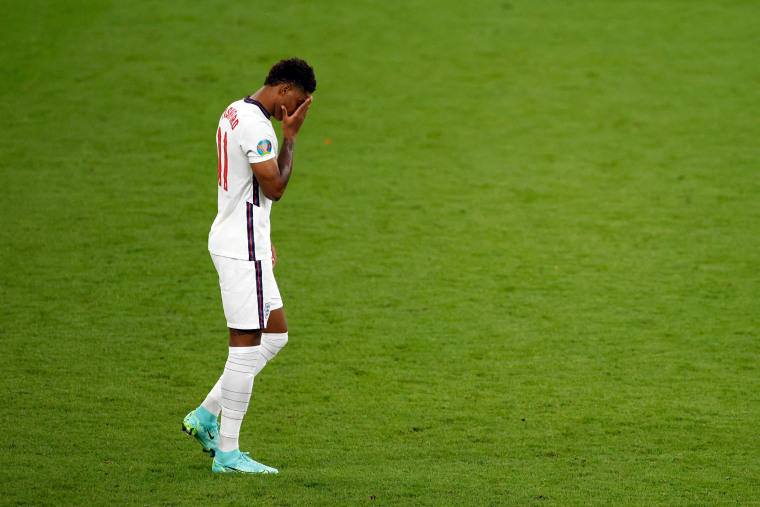LONDON — The U.K. was “by far” the largest country of origin for abusive, racist tweets sent to England’s soccer players last month after the team lost the European Championship final to Italy, Twitter said Tuesday.
Twitter also said that 99 percent of accounts suspended for sending racist abuse during the tournament were not anonymous, so the type of ID verification called for by some British politicians would have been “unlikely to prevent the abuse from happening.”
Twitter’s findings contradict post-tournament comments by England manager Gareth Southgate, who said that a lot of the abuse, which targeted Black players including Marcus Rashford, Bukayo Saka and Jadon Sancho, came from outside the U.K.
Southgate described the abuse, which came after those players missed penalty shots during a shootout tiebreaker in the final, as “unforgivable” but added that “a lot of that has come from abroad.”

His words echoed findings released in March by the Premier League, which has monitored online attacks on players, staff members and officials since 2019, showing that 70 percent of the abuse typically came from outside the U.K.
According to the social media company’s review of what happened in the aftermath of the final, outlined in a blog post, 2,087 racist tweets were removed by July 14 (three days after the final), the vast majority by Twitter’s automated tools for detecting abuse.
“We are determined to do all we can to stop these abhorrent views and behaviors from being seen on our platform,” Twitter said in the blog post. “We can do better.”
Eleven people have been arrested so far in connection with online racist abuse of England’s soccer players after the July 11 final at Wembley Stadium in London for offenses that include malicious communications, the U.K. Football Policing Unit announced Thursday.
Download the NBC News app for breaking news and politics
The police unit said that of the 207 criminal social media posts identified on Twitter, Facebook and Instagram, 34 accounts were identified as being in the U.K.; 123 — more than half — belonged to people outside the U.K., and their details were being shared with the relevant countries. It was waiting for information from social media companies about 50 account holders.
British police did not immediately respond to questions about their methodology.
Twitter said that since February it had taken several steps to combat racist abuse against soccer players, including having meetings with players and their representatives to hear their concerns directly and improving the platform’s proactive content moderation tools.
It is also testing a new product feature that automatically and temporarily blocks accounts that use harmful language so they cannot interact with targets’ accounts and sends notifications to people when they draft replies that Twitter determines to be harmful, with suggested revisions. During early trials, the prompt has led more than a third of people to rewrite their replies or not send them at all, Twitter said.
“However, we have to be honest that the progress we will be able to make alone would be magnified by greater interventions across the board,” Twitter said, saying tackling the issue requires a collective approach from tech companies, government and soccer authorities. “As long as racism exists offline, we will continue to see people try and bring these views online — it is a scourge technology cannot solve alone.”
Twitter’s analysis coincides with an announcement by the Premier League of enhanced anti-discrimination measures to be introduced this season, including bans for “any individual found to have behaved in a discriminatory of abusive way towards any club employee, player, match official, matchday steward or fan attending a Premier League match.”
The measures will cover both in-person and online behavior, the Premier League said in a statement, adding that it was working with social media platforms to “improve existing tools and develop processes to tackle abuse.”
